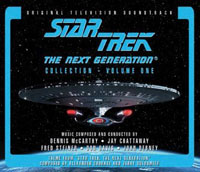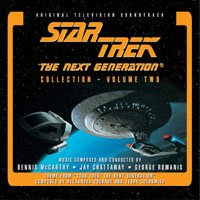Symbiosis
(Star Trek - The Next Generation episode production code 123)
Deutsch: Die Seuche (The Epidemic)
Français: Symbiose
Español: Simbiosis
Italiano: Simbiosi
story by Robert Lewin
teleplay by Robert Lewin and Richard Manning and Hans Beimler
Of all of The Next Generation's Season One stories, this is the
only one that I remembered as having dealt with the Prime Directive
before embarking on a revisit of the season for purposes of
writing this article. This is probably due in large part to the
extra emphasis and emotion that Captain Picard and Doctor Crusher
put into their arguments for and against following it.
Their scene in the elevator in particular is burned into my brain
as the first of four key Prime Directive moments for
The Next Generation series, and the one that really defined
Captain Picard's take on the order.
I think perhaps part of the power of this moment stems from the
fact that Patrick Stewart and Gates McFadden had found their
characters by this point, and were able to express their arguments
through a sincerity of character. This is a sharp contrast from
"Code of Honor", where lengthy Prime Directive speeches seemed
to just blather on from out of nowhere, having little relevance
to what was going on in the episode.
The writing in this episode is just generally far superior to
most other Prime Directive tales of the season. Many complex
social issues are in play here, and the Enterprise crew are
neatly led to explore them one by one as they dig deeper into
the layers of intrigue in the guest characters' situation.
It definitely helps keep audience interest running high,
always wanting to find out more. Nicely done.
I think it is important to note that there are TWO distinct
addictions in play here concerning the "Felicium" commodity.
The obvious one that gets plenty of discussion in the episode
is the Onarans' physical/emotional addiction. Without this
the Onarans will suffer withdrawal symptoms. Dr. Crusher
becomes a big advocate of "curing" this.
The other addiction is even more insidious, partly because it
doesn't really get discussed. The Brechians are FINANCIALLY
addicted to Felicium. Without their fix, they will *supposedly*
have no food, water, shelter, luxuries, electricity, transportation,
etc., etc. They will suffer far more than withdrawal symptoms
should their usual deal cease. And although Picard's interpretation
of the Prime Directive kind of deals with that, it seems to do so
without any clue as to what it is doing.
Now of course, this is where the premise of the episode loses
almost all believability, in saying one entire planet is all wrapped
up on one side of this deal, while the other is totally wrapped up
with the other, while only three spacecraft with a crew of six each
are the only means of transportation between the two. Each planet
would have to have extremely small (and undiversified) populations
to make that remotely credible, and the "billions of doses" in
the container would seem to grate against that idea.
It is also strange that Onara seems to be on C.O.D. terms with
their neighbours as the story opens.
You'd think they'd be allowed some form of credit already
after hundreds of years of trade.
And considering how concentrated Felicium is,
and the fact that the Brechians need to get everything else in
life in return for the Felicium, how could one ship hold enough
"everything" on board to pay for that much Felicium in the
first place? Currency is no good as payment, if the only place
the Brecchians can buy their basic necessities is on Onara.
They would need enough transportation to haul billions of
necessities back.
Yet again "Trek" is resorting to a contrivance in order to dramatize
the philosophical point of the story. Since that is a good aim,
we will give it some rope.
What of the Prime Directive itself?
We do note that the Enterprise crew threw themselves into
aiding these two societies without really checking first
if the Prime Directive allowed them jurisdiction.
Perhaps Onara and Brecchia are able to trade within
their own star system without having acquired warp drive,
and even if they have acquired it, it wouldn't be too much
of a stretch to discover that they have subsequently lost
knowledge of how to maintain and repair that technology.
Anyway, the Enterprise crew do the right thing, jumping in
to help, after which the old traditional Prime Directive
is mostly a moot point.
But the Next Generation's first season seems keen to show
that the Prime Directive also now governs trade agreements
to some extent after contact, in still improperly defined terms,
so let's see where that goes. Again, the Enterprise crew
jump right in, trying to do good, offering spacecraft repair parts.
And so they've apparently begun trading with Onara,
or the combined societies of the whole system, depending on
how you look at it. IF the Prime Directive allows that,
surely it should allow Dr. Crusher to offer the
non-addictive Felicium substitute she claims she can easily
replicate for them. Prime Directive aside, there is another
potential sociological danger in that idea, often termed "enabling",
which in essence is like continuing to spoil a spoilt child
instead of letting them taste the unpleasant consequences of
their actions that can help them grow into better habits.
Since Doctor Crusher has a plan to wean them gradually off of
her substitute, I think she does clear herself of the "enabling"
sin.
What she clearly doesn't think of at all is doing something
similar for the Brecchian financial addiction. Being upset
with them for exploiting a neighbouring culture, she would
have them get over their situation by "going cold turkey".
She does in essence take sides. Captain Picard's position
thus is more balanced, but he never does manage to articulate
as much. It's as though he knows he's doing the best thing
by following the Prime Directive, but has no real clue
why it works.
And it is unfortunate that in several scenes, where characters
are turning to him and begging for some kind of decision,
he appears to be at a loss for words, philosophy, or
a plan of action. A bit disappointing to be sure, and
eating into his capacity to show charisma and leadership.
I think Doctor Crusher's frustrations manage to point to the
heart of the limitations of the Prime Directive, which all too
often advocates a lack of interaction. There is more one can do,
and better philosophies to live one's life by. One is to place
honesty above secrecy. The discoveries made by the Enterprise
crew regarding Felicium wouldn't be kept from the Onarans under
my watch. And if they want to trade with the Onarans and give
them engine coils and Felicium substitutes, fine and dandy.
Don't spare Brecchia the consequences of dealing with truth
and competition in the marketplace, otherwise you will be
"enabling" their addiction.











 (regular)
(regular)



